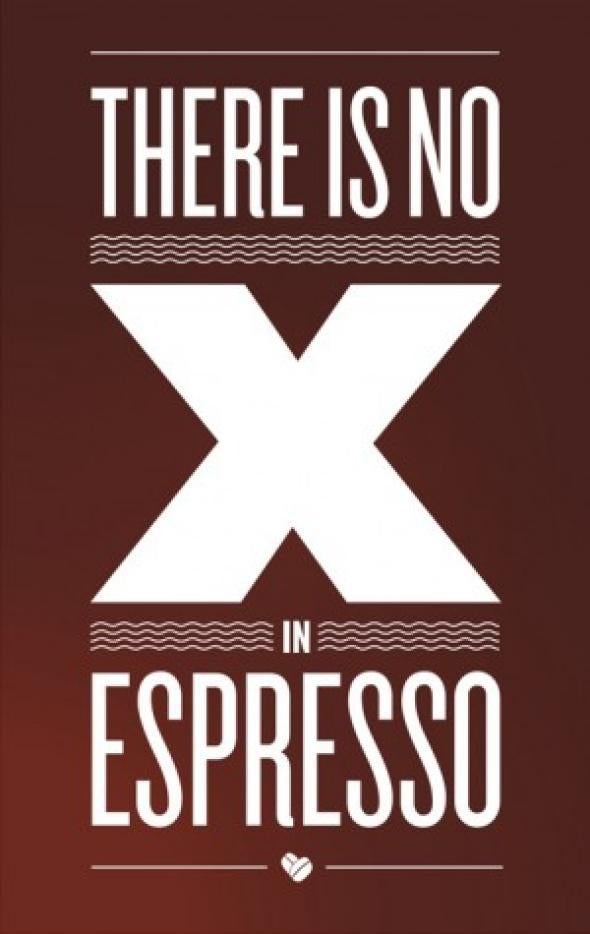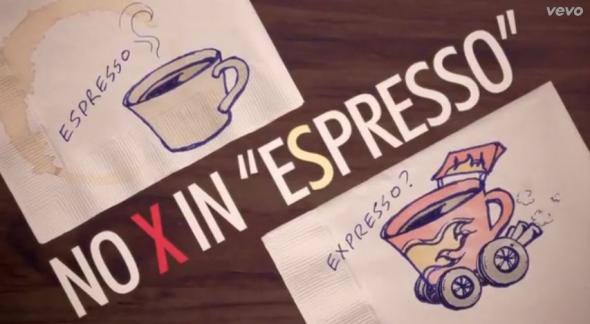I know, enough already about Weird Al Yankovic’s “Word Crimes,” but bear with me for one more comment on the music video that’s given language prescriptivism its biggest shot in the arm since the glory days of Eats, Shoots & Leaves. Perhaps the weirdest of the 17 admonitions Weird Al crams into the song comes at about the halfway point, when he croons, “There’s no x in espresso,” over the image above.
“Weirdest” because, compared with less-fewer, literally, could care less, and Weird Al’s other talking points, it would appear pretty narrow, not to say obscure. But there turns out be a fairly substantial body of commentary on the point, most of it echoing the video’s disapproval of expresso. Garner’s Modern American Usage has no doubt on the rightness of espresso and notes, “writers frequently get this wrong.”
Merriam-Webster’s Dictionary of English Usage, predictably, is less judgmental, allowing only (on the matter of correctness) that espresso “is undoubtedly favored by the cognoscenti.” (And good on MWDEU for resisting the urge to say “snobs”!) The dictionary explains that the drink is known in Italy, where it originated, as “caffe espresso, or just espresso for short.” It goes on: “Contrary to a popular belief of English-speakers, the espresso means not just ‘fast’ but ‘pressed out’—it refers to the process by which the coffee is made, not the speed of the process. The idea that caffe espresso means ‘fast coffee’ may have contributed somewhat to the occurrence in English of the variant expresso.”
I would add that x-after-opening-vowel has proved to be popular in such pronunciations as “aks” (instead of “ask”) and “ekcetera,” not to mention that words beginning with “exp” are eight times more common in English than words beginning with “esp,” so there may be something about expresso that just wants to be said.
Whatever the source of its appeal, expresso has had a long and not entirely disreputable history. The Oxford English Dictionary lists it as an acceptable variant. Between 1945 (date of the OED’s first citation) and 1960, it was permitted in The New York Times, with 43 uses compared with 122 for espresso. The paper noted in 1947 that “the Bazaar Francais has some new single-cup pots, one of the expresso style from Italy,” and in 1954, “Expresso coffee has been familiar in New York’s numerous Italian restaurants for many years.”
The spelling was also widely used in Britain, especially in references to the coffee houses popular with the bohemian set in Soho. The Spectator in 1958 referred to “the expresso poet with his impeccable Oxford accent, grovelling in dirt.” A 1960 satire with Laurence Harvey and Sylvia Syms, Expresso Bongo, is described this way on IMDB: “Johnny Jackson [Laurence Harvey], a sleazy talent agent, discovers teenager Bert Rudge [Cliff Richard] singing in a coffee house. Despite Bert’s protestation that he really is only interested in playing bongos, Johnny starts him on the road to stardom.”
Since the 1970s, espresso has reigned, an apparent consensus one can see evidence of in Garner’s entry and in Weird Al’s finger-wagging. One barista reports, “The dreaded X that so many people use while confidently ordering their espresso makes me cringe every time,” so much so that he or she has designed and marketed a reminder, available in poster or T-shirt form:

Dear Coffee I Love You
But as I say the consensus is “apparent,” and there is a robust counternarrative. Contrarians have pointed out that expresso is the norm in France, Portugal, and Spain. Admittedly the art of making the drink was invented and perfected in Italy, so it’s understandable that the terms used in that country should get favored-nation status. But Italian corrupted the Latin root, which has … wait for it … an x.
Furthermore, we are not in Italy but America, and terminology changes when it crosses oceans. Who among us has not, when ordering a single cookie, asked for “a biscotti”? Even first-generation Italian-Americans embraced the variant, according to someone who demurred from an expresso-hating conversation on Serious Eats: “My grandfather who came from around Trieste always said expresso; so did all the Sicilian and Neopolitan relatives in the family my aunt married into. It was also how it was pronounced around Arthur Avenue, a few blocks from where I grew up in the Bronx in the unpretentious 50s and 60s.”
I don’t know about you but for me, all this has worked up a powerful thirst for a macchiato. Ciao, baby.
A version of this post appeared on Lingua Franca.
